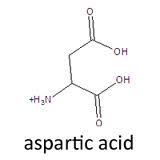Literally
meaning: “pertaining
to asparagine”
Origin: Anc Greek
ελλ ἀσπάραγος (plant)/asparagos(asparagus) >σπαργάω(=vigor)
Coined/History
Asparagine was isolated in 1806 by French chemist Louis
Nicolas Vaquelin (1763-1829) and named by French chemist Pierre Jean Robiquet(1785-1838) because it was
isolated by asparagus juice. The name of aspartic acid was subsequently
given in 1927 by Plisson to the acid obtained heating asparagine with lead
hydroxide (base).
Aspartic acid is a non
essential aino acid. Salt, ester or carboxylate anion of aspartic acid is
called aspartate. Aspartic acid plays an important role in Krebs cycle during
which other amino acids are synthesized. Aspartic acid is used to treat fatigue
as it moves the NADH molecule to mitochondria, where it used to generate ATP
(energy). Aspartame (an artificial sweetener) is made by aspartic acid and
phenylalanine.


No comments:
Post a Comment